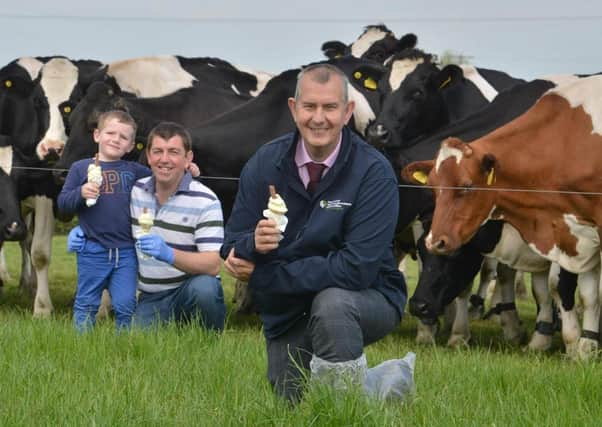This year’s pandemic has shown how reliant we are on rural communities - Minister Edwin Poots


For generations our rural communities have faced unique challenges head-on and with a sense of grit and determination. They’re a resilient lot, but this year COVID-19 means they have faced unparalleled hardships and stresses.
But I’ve never been more impressed at how they have responded to the many challenges presented to them during this pandemic and the hurdles they have overcome.
Advertisement
Hide AdAdvertisement
Hide AdThis crisis has not only brought into sharp focus how dependent we are on our farm families and rural communities for food and services, but has also exaggerated some of the deep-seated vulnerabilities they face – from isolation and loneliness, to mental health, access to services and significant financial difficulties.
So supporting our rural communities has been a key priority for me during this year including providing funding for a wide range of support services and practical assistance to help individuals, organisations and rural businesses. I have pumped tens of millions of pounds into providing a range of supports for our rural dwellers, businesses and communities including training on safety issues related to COVID restrictions, mental and emotional health support, delivery of essential services, resilience training, farm and business support and crucial industry funding.
Our £25 million COVID-19 support funding package, the most comprehensive and extensive package in the UK and EU, was secured to provide immediate help to those hardest hit financially as a direct result of the pandemic and help their businesses survive the crisis. This has already benefited approx 11,300 farm businesses in the beef, dairy and sheep sectors to the tune of £18.2m.
Potato growers who specialise in supplying the processing market for food service and hospitality were impacted significantly during the lockdown period.
Advertisement
Hide AdAdvertisement
Hide AdA budget of £1.6m had been allocated to this sector and applications to that fund are being assessed. Our ornamental horticulture sector also faced major disruption to its markets at the height of its busiest period in the year, and also been allocated a budget of £1.6m for crucial financial support.
I have secured £3.2m for our full-time fishing fleet as they have faced tough times due to Covid with depressed markets and closure of hospitality sector.
Through my department’s Tackling Rural Poverty and Social Isolation Programme some £7million of COVID-19 support funding has been directed into supporting vulnerable rural dwellers with initial lockdown issues and more recently in helping rural businesses and communities with recovery.
Initiatives have been delivered directly by my department but also by working in partnership across central and local government and the community and voluntary sector so that the most effective mechanisms to support those in need were utilised.
Advertisement
Hide AdAdvertisement
Hide AdCOVID-19 hit hard at our micro and small business owners, particularly in rural areas, with a downturn in trade. So my focus has been towards recovery and part of that is to help rural businesses have confidence to invest and expand, and to stimulate economic growth and development.
Our £2 million stimulus fund aims to do just that by providing grants of up to £4,999 to over 600 businesses to either help them grow, sustain their business or indeed assist them in dealing with COVID-19 regulations. I am also bringing forward a number of pilot projects with grants of up £40,000 for 40 businesses to invest in innovation and new technologies and so improve efficiency and productivity whilst creating growth in the rural economy. Additionally over £1m is available to boost rural tourism. And for the first time in Northern Ireland we paid our farmers their full Direct Payments in October with over 94% of payments totalling £265.7million going out on the first day.
COVID-19 was a shock to the agri-food industry and caused a significant downturn in the trading ability of the sector so this financial support is helping sustain our farming families and farm businesses as they continue to produce high-quality food.
The work of CAFRE in supporting and training the sector has also continued since lockdown with telephone advice, technical films and articles video-conferencing and webinars.
Advertisement
Hide AdAdvertisement
Hide AdRecovering from this pandemic and helping our rural communities thrive whilst moving our rural economy forward is essential. Tremendous work has already been done to support people during the crisis and we need to act upon this and continue to help people during tough times.
We cannot rule out the possibility of further market disturbance as a result of this pandemic and the need for further support.
So my regular engagement with a range of stakeholders and representatives to discuss concerns and proposals about how the sectors should be supported will remain. That important consultation must continue as we plan to rejuvenate our rural communities and business after this pandemic by developing their potential to make a significant contribution to our shared economic recovery.
I hope these funding and support schemes show my deep commitment to helping our rural communities remain resilient and innovative.
Comment Guidelines
National World encourages reader discussion on our stories. User feedback, insights and back-and-forth exchanges add a rich layer of context to reporting. Please review our Community Guidelines before commenting.